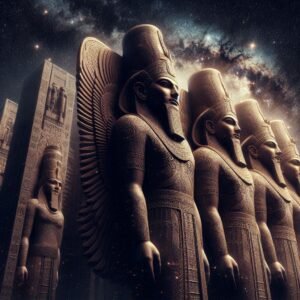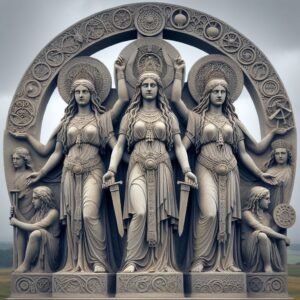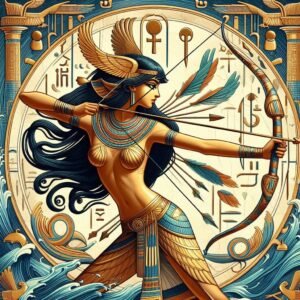
Lugalbanda was a legendary Sumerian king of Uruk, often considered a hero in Mesopotamian mythology. He is known for his adventures and heroic deeds, and is also notable for being the father of the famous hero Gilgamesh, as mentioned in the Epic of Gilgamesh. His consort was Ninsun, a goddess, and he was later deified and worshipped in various Mesopotamian cities.
Lugalbanda’s adventures
Lugalbanda’s adventures are detailed in two main Sumerian tales: “Lugalbanda in the Mountain Cave” and “Lugalbanda and the Anzu Bird.” In the first story, Lugalbanda falls ill during a military expedition led by King Enmerkar and is left in a mountain cave. Despite his dire situation, he prays to the gods and miraculously recovers.
In the second tale, Lugalbanda encounters the fearsome Anzu Bird. Through his bravery and cleverness, he befriends the bird, which helps him find his way back to his comrades. These stories highlight Lugalbanda’s resilience, piety, and resourcefulness, qualities that made him a revered figure in Mesopotamian mythology.
Lugalbanda’s adventures often involved conflicts with various adversaries. One notable enemy was the lord of Aratta, Ensuhkeshdanna, who opposed King Enmerkar of Uruk, Lugalbanda’s leader.
Ensuhkeshdanna, also known as Ensukushsiranna, was a legendary ruler of the ancient Sumerian city-state of Aratta. He is best known for his rivalry with Enmerkar, the king of Uruk. In the epic “Enmerkar and Ensuhkeshdanna,” Ensuhkeshdanna demanded that Enmerkar submit to him, claiming superior connections with the goddess Inanna. Enmerkar refused, asserting his own divine favour and engaging in a series of contests and taunts with Ensuhkeshdanna.
The conflict between Ensuhkeshdanna and Enmerkar is a central theme in Sumerian literature, highlighting the political and divine struggles of the time. Despite his initial confidence, Ensuhkeshdanna ultimately faced defeat, showcasing the complex interplay of power, diplomacy, and divine favour in ancient Mesopotamian mythology.
The contests between Enmerkar and Ensuhkeshdanna are detailed in the Sumerian epic “Enmerkar and Ensuhkeshdanna.” These contests were primarily tests of wit and divine favour. Ensuhkeshdanna demanded that Enmerkar submit to him, boasting of his superior connection with the goddess Inanna. Enmerkar responded with creative taunts and claimed that Inanna favoured him instead.
The rivalry escalated when a sorcerer named Urgirinuna, allied with Ensuhkeshdanna, attempted to sabotage Enmerkar’s livestock. However, a wise woman named Sagburu outperformed the sorcerer in a series of magical contests, ultimately leading to Ensuhkeshdanna’s defeat.
These stories highlight the themes of divine favour, cleverness, and the power of magic in ancient Mesopotamian mythology, and these conflicts are central to the tales of Lugalbanda, highlighting his bravery and strategic prowess.
Marriage to Ninsun
His marriage to Ninsun, a goddess associated with wild cows, is described in various Sumerian literary sources. One of the earliest texts, found in Abu Salabikh, depicts a romantic relationship between Lugalbanda and Ninsun. This marriage not only highlights Lugalbanda’s esteemed position but also intertwines human and divine elements in Sumerian lore.
The Abu Salabikh texts, dating back to the Early Dynastic period, recount the marriage between Lugalbanda and Ninsun, though the text is notably difficult to interpret due to its fragmentary and complex nature. These texts describe their first meeting and subsequent marriage, but offer limited details about Ninsun’s functions or the broader context of their union. Despite the challenges in translation, these texts are significant as they contribute to our understanding of early Mesopotamian mythology and the divine genealogy that includes Gilgamesh, their son.
Deification
Lugalbanda’s deification is rooted in his legendary status and heroic deeds, which were celebrated in Sumerian literature. Initially, he was a mortal king of Uruk, known for his bravery and wisdom. His exploits, highlighted his piety, compassion, and extraordinary abilities.
Over time, his reputation grew, and he was revered as a divine figure. By the Ur III period (circa 2100-2000 BCE), Lugalbanda was worshipped as a god, with temples dedicated to him and his consort Ninsun. His deification was further solidified by his association with Gilgamesh, his son, who was also considered semi-divine. This divine lineage and the continued veneration of Lugalbanda in religious texts and rituals contributed to his enduring status as a deity in Mesopotamian culture.
Subscribe to our post updates - Don't miss a thing!!







